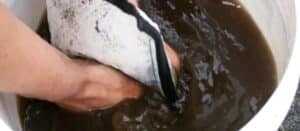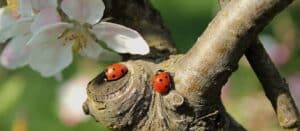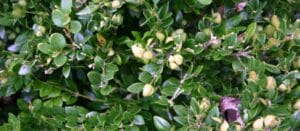Ever wonder why clover seems to grow better in your lawn than the grass does? Whether clover in your lawn is a good thing or a bad sign of other problems? Or why it grows there in the first place?
Keep reading to learn what causes clover in the lawn and what to do (or not do!) about it.
Why Clover Is Taking Over Your Lawn
There are probably several reasons for the appearance of clover among the blades of grass, including the following:
The soil pH is too low or too high for lawn grass
Clover grows well in almost any pH so it’ll be happy no matter what the soil pH is, even when your turfgrass isn’t.
The soil is deficient in important nutrients, especially nitrogen
Clover thrives in nitrogen-deficient soil. In fact, white Dutch clover is an indicator plant for low nitrogen – meaning that if you see it growing in your lawn, it probably means the soil is low in nitrogen.
A well-timed application of organic spring lawn fertilizer can help bump up nitrogen levels (and reduce the amount of clover).
The grass has been cut too short
Longer grass shades and crowds out other plants, such as clover. Keep your mower blade at 3 1/2 inches or higher to encourage taller grass and deeper roots.
To keep your grass in tip-top shape, check out our Organic Lawn Care Tips.
The grass doesn’t get enough water
Stressed grass is less dense, leaving room for clover and other weeds.
Try watering slowly and deeply (the soil should be moist all the way down to 4-6″ below the surface) once or twice a week during dry periods versus frequent, shallow watering. Watering in the morning prevents turfgrass diseases.
The soil is compacted (usually due to lack of organic matter)
Clover tolerates compacted soil better than lawn grass and has longer roots, enabling it to access water at deeper levels that your grass can.
Core aeration, a process that loosens compacted or heavy soils, can create a better growing environment for turfgrass and help reduce the amount of clover and other weeds in the lawn.
Controlling Lawn Clover
So, what can you do about clover growing in your lawn?
The best, organic, way to control clover in the lawn is to properly care for the lawn – mow high, water regularly so strong, thick, healthy growth is maintained, and feed the lawn properly with an organic lawn treatment.
For more details on how to get rid of clover in the lawn, check out our article on Cultural Practices to Reduce Lawn Weeds.
Benefits of Clover in the Lawn
However, you may want to consider leaving the clover alone. It wasn’t until recently, when herbicides became popular, that clover was considered a weed. In fact, lawn seed mixes used to deliberately include clover (such as white Dutch clover) – something that some seed providers are now starting to do again.
Because clover takes nitrogen out of the air and soil and makes it available to your lawn, it helps the lawn grow healthier and more pest-resistant, and reduces the amount of fertilizer required. It also requires less frequent mowing, attracts honeybees and other pollinators (although that may not be a positive if you’re allergic to bee stings), and breaks up compacted soil.
The one drawback to clover is that it doesn’t stand up to heavy foot traffic quite as well as turfgrass (these are our top recommendations for the best types of turfgrass to grow in New Jersey and Pennsylvania).
So perhaps it’s time to reconsider what a healthy lawn should look like. Maybe you’d be happy with a lovely swath of green – with beautiful white clover flowers throughout…
But, if not, give us a call at 908-309-6611 to see how we can remove clover from your lawn. Or click the button below to contact us online.
GET THE LATEST NEWS
Subscribe to the Organic Plant Care Newsletter and get timely and helpful tips and updates monthly.
There's no spam - we promise!





